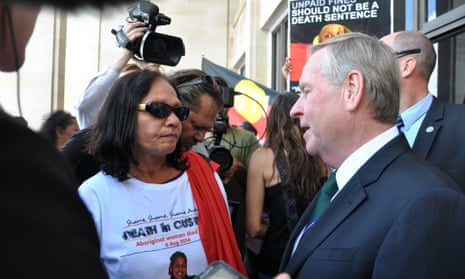Western Australia will review the overrepresentation of Indigenous people in the state’s prisons, Colin Barnett has announced, more than a month after the premier committed to action on Aboriginal deaths in custody.
But the family of a woman who died in a Port Hedland watchhouse in August after she was incarcerated to “pay down” unpaid parking fines, say Barnett has not responded to requests for a meeting, despite his promise to find “the truth” about the death.
Barnett made his commitments at a national day of action on 23 October, when hundreds of people gathered in capital cities to protest about the death of a 22-year-old Yamatji woman, referred to as Ms Dhu for cultural reasons. She died in a South Hedland watchhouse in August after complaining of pain and ill health. She was taken to hospital three times but returned to custody twice, reportedly without being examined by a doctor.
Addressing the Perth protest on the steps of parliament, Barnett made a “personal commitment” to work with his ministers to reduce the number of Indigenous people in the state’s jail system, and deaths in custody.
“I will do that, you then judge me on whether I succeed or not, but I give you that commitment today,” he said.
He told Ms Dhu’s mother, Della Roe: “I promise you, whatever the truth is we will find it and I am very sorry for your loss.”
On Wednesday Barnett said in a statement that as a result of his public promise, “a team within the Department of the Premier and Cabinet comprising representatives from the Department of Corrective Services, WA Police and the Department of Aboriginal Affairs is reviewing deaths in custody and the high representation of Aboriginal people in Western Australia’s prison system”.
“The team is currently examining all available data and will then recommend short- and long-term policy responses for the government to consider. There will be consultation during the process.”
Marc Newhouse, chairman of the deaths in custody watch committee WA, and who has been representing the deceased woman’s family, said any discussion needed to involve “people on the ground” and would show no results if left to ministers and bureaucrats.
“We think there should be a wide range of community discussion and genuine consultation of people on the ground and relevant organisations if they’re serious about reducing the number of people in prison,” he told Guardian Australia.
A week after the protest the family wrote to Barnett, requesting a meeting with him in Port Hedland.
“Ms Dhu died in police custody in this area and the family believe it would be a sign of respect on your part to talk with them there and hear the feelings of the community,” the letter said.
“It is our hope that you can visit before the end of the year.”
Barnett is yet to reply to the 31 October letter, or one that preceded it on 20 October.
Following questions from Guardian Australia, a spokeswoman for Colin Barnett said a response to the letters was being prepared.
She said a meeting had been scheduled in Perth for 6 November but it was cancelled by a family member of Ms Dhu. She said an offer to reschedule in Perth had received no response.
“I understand that the preparation of a response to the correspondence from Mr Newhouse on October 20 and 31 was postponed pending this meeting and further postponed while there was some expectation that the meeting might be rescheduled in Perth,” she said.
Indigenous incarceration rates are 13 times those of non-Indigenous people, and the gap is even larger among women and young people.
The state has the highest ratio of Indigenous of non-Indigenous prisoners, and is yet to implement many of recommendations from the 1991 royal commission on deaths in custody.
On the day of the Perth protests an Indigenous man died at Casuarina prison, and a coronial inquiry into the death of Maureen Mandijarra in a Broome police cell in 2012 was delayed because police did not provide a mandatory investigation file.
Following increasing public pressure, the completed file was forwarded to the state coroner on 15 September.
“The length of time taken for this investigation was affected by the principal investigation being expanded to include the examination and testing of policy with respect to custodial care,” the WA attorney general Michael Mischin told parliament on Tuesday.
Ms Dhu was locked up at South Hedland to “pay down” about $1,000 in parking fines, a policy her family and their supporters are calling for an end to. The Australian reported on Tuesday that no magistrate had ever ordered her to be incarcerated.
More than 1,000 people a year are jailed in WA over unpaid fines, according to figures released by Labor last month.

Comments (…)
Sign in or create your Guardian account to join the discussion